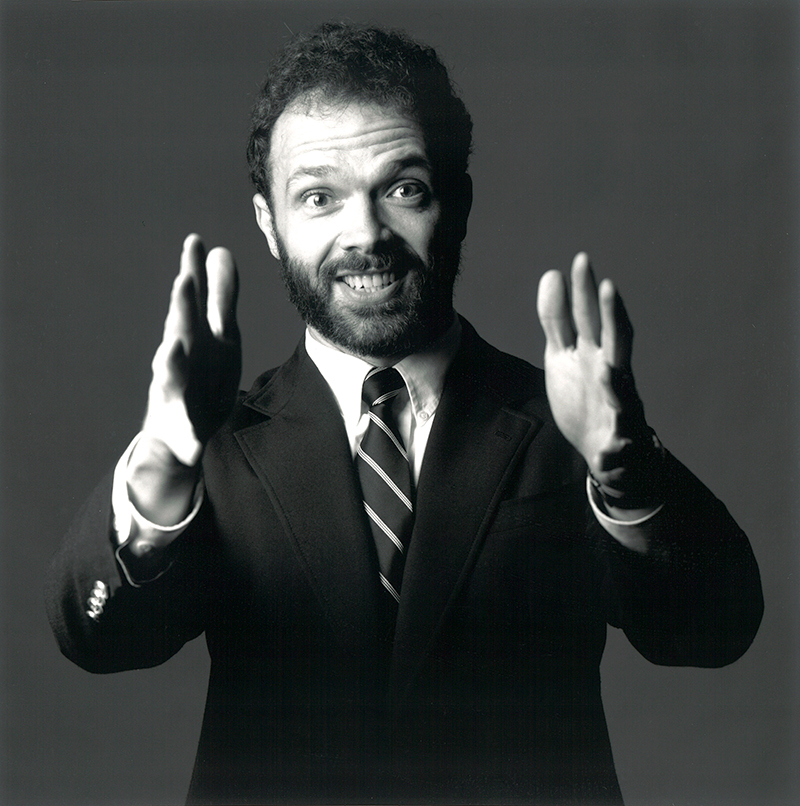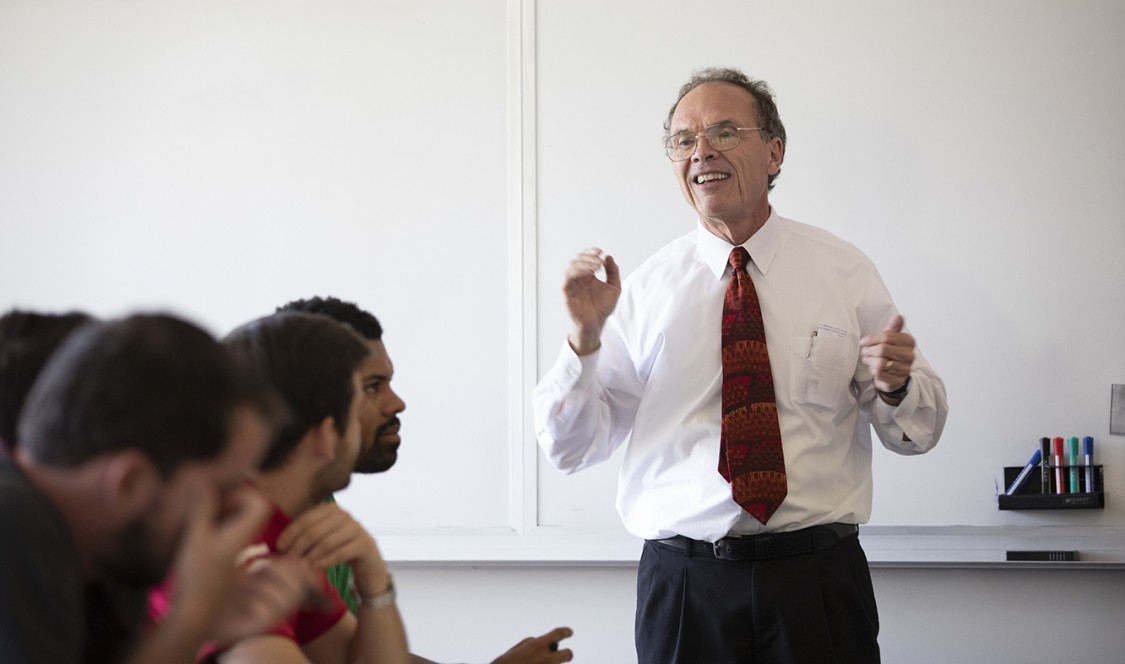Jack Pitney has spent his entire academic career at CMC. As he marks his 35th work anniversary, the beloved government professor reminisces about crossing paths with the founding generation in the 1980s, and reflects on the historic changes he has witnessed across the years.
The first time Jack Pitney set foot in the Golden State was to interview for his current job.
The year was 1986. Pitney was a newly minted Yale PhD who’d worked a few years in Washington, D.C. Born and raised in upstate New York, he’d never ventured farther west than Wyoming (on a trip with then-Congressman Dick Cheney).
“When I told my parents I was moving to California, it was like telling them I was moving to Pluto,” Pitney said, flashing his signature crooked grin.
Behind the impish smile, however, there lurks gratitude and a sense of the weight of history.
Now, as Pitney approaches his 35th work anniversary, the beloved professor of government reflects on the great men who befriended him and the “great blessings” of having spent his entire academic career at CMC.

“Coming here in the 1980s, I got to know the founding generation,” he said. “I knew George C.S. Benson pretty well. I got to know Donald McKenna. That was a great blessing. I even got to know Orme Phelps.”
Phelps, an economist born in 1906, had been one of the founding president’s first hires. His father was a Union soldier who’d studied with Abraham Lincoln’s law partner.
“I just feel blessed—I keep using that phrase—to have ended up here,” Pitney said.
As a young social scientist, Pitney felt the pull of political history, and it tugs gently even now, whenever David Dreier ’75 talks about Richard Nixon. The CMC trustee and founder of the Dreier Roundtable held Nixon’s old Congressional seat in the 1980s and stayed close to the fallen president in later life.
George Benson also knew Nixon well. Claremont was in the 12th district, and in 1950, the day Nixon announced his run for the U.S. Senate, CMC’s founding president handed him the mic. Benson went on to oversee ROTC for the Nixon administration during Vietnam.
Knowing Dreier and Benson, who died in 1999, has influenced Pitney’s Nixon scholarship and enriched his in-depth course on the 37th president.
The son of a milkman and a homemaker, Pitney grew up in Saratoga Springs, New York, and attended Union College in Schenectady. While working on his PhD in political science at Yale, Pitney moonlighted as a staffer with New York State Sen. John R. Dunne, U.S. Sen. Alfonse D'Amato (NY) and U.S. Rep. Dick Cheney (WY). Pitney also spent two years as a domestic policy analyst with the U.S. House Republican Research Committee.
He returned to Washington, D.C., on a three-year leave of absence from CMC, to direct the research department of the Republican National Committee.
He and his wife, Lisa Minshew Pitney ’88, fell in love in the political trenches working for George H.W. Bush’s 1988 presidential campaign. She is now a government relations vice president with the Walt Disney Company.
From their La Crescenta home, she heads west to Burbank and he goes east to Claremont.
Pitney’s 35-year career at CMC has been productive and personally rewarding.
Beloved by students and alumni, he’s a three-time winner of the Glenn R. Huntoon Teaching Award, for which he was tapped in 1995, 2000 and, again, in 2004. Other accolades include the Presidential Award, in 2013, and the Richard M. Shure Award for excellence in teaching, in 1988.
In 2012, Princeton Review named him one of the 300 best professors in the United States from a field of 42,000 top-rated faculty. The designation was based entirely on student evaluations.
An acclaimed teacher and prolific scholar, in 2004, Pitney was installed as the Roy P. Crocker Professor of American Politics. His writings include 12 books, 34 book chapters, some 30 journal articles and book reviews, and more than 250 opinion pieces for major media outlets. Together with CMC colleague Andrew E. Busch, Pitney has co-authored a series of presidential election-year post-mortems, the most recent of which, Divided We Stand: The 2020 Elections and American Politics, was released in February 2021.
Asked if he’s excited to be recognized at convocation for his 35 years of service, Pitney nods agreeably. But what he’s really excited about, he said, is getting back in the classroom with real, live students.
“I want to be Mr. Chips, not Max Headroom,” he said, expressing the teacher’s version of screen fatigue. When it comes to the big screen, though, Pitney has few qualms. He’s an unapologetic junkie. After nearly two years in multiplex exile, he was ecstatic to finally see Black Widow in a theater.
Gangsters, police drama and superhero action are his favorite sub-genres. Generations of CMCers have received this pearl of wisdom from Pitney: “Everything you need to know about life is in The Godfather.” He can recite the dialogue from memory.
Pitney also watches a lot of TV. To maximize his efficiency and productivity, he streams content to his iPad while working out. “I’ve gotten through all of “Mad Men,” “The Wire,” and “The Sopranos” while on the elliptical trainer,” he boasts.
There’s little downtime in Pitney’s life. Besides his teaching (currently, Gov 20H and Gov 116) and writing (the next book will re-examine George H.W. Bush’s breaking of his “read my lips” pledge), he spends many hours a week mentoring students (seven senior theses and two Appel fellows). Until recently Pitney also coached his two teenage kids through nightly homework.
Now that son JP, 19, is starting college at Pepperdine, Pitney’s homework-support services have been cut in half. Daughter Hannah, 15, a rising sophomore at Flintridge Prep, still gets his nightly supervision.
“Which means, God willing, I expect to be at CMC for quite a while to come,” Pitney chuckles, with dry humor. At 66, he said he won’t “be retiring anytime soon—because I have lots of tuition in my future.”
After 35 years, Pitney is starting to see the children of former students pop up in his classes. That happened last semester, when Caroline Bullock ’24 enrolled in Gov. 20 Introduction to American Politics. She’s the daughter of Montana Governor Steve Bullock ’88, a former Pitney advisee. The last time he offered Gov 115 Politics of Journalism, Lukas Svitek ’20 showed up. Exactly 30 years had passed since Lukas’ father, Ivan Svitek ’90, took the same class.
Reflecting on what has changed in the intervening years, Pitney points to:
- far greater student diversity (“In the 1980s, CMC was primarily a California or West Coast school, with a strong male majority”)
- an uptick in academic excellence (“We had really good students in the 1980s, but we have a way, way bigger share of valedictorians now”), and
- a rising reputation, which has attracted new resources (“When we started making the top 20 in US News & World Report, that gave us some national visibility. And we’re a much richer college now.”)
But Pitney is pleased that some things haven’t changed at all—like “the emphasis on teaching, the strong relationships between students and faculty, the small class sizes, and the emphasis on advising.
“I look forward to being able to do all that in-person again,” he said.

